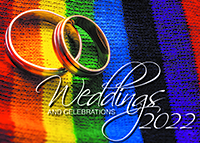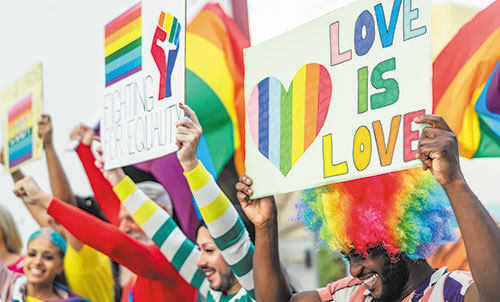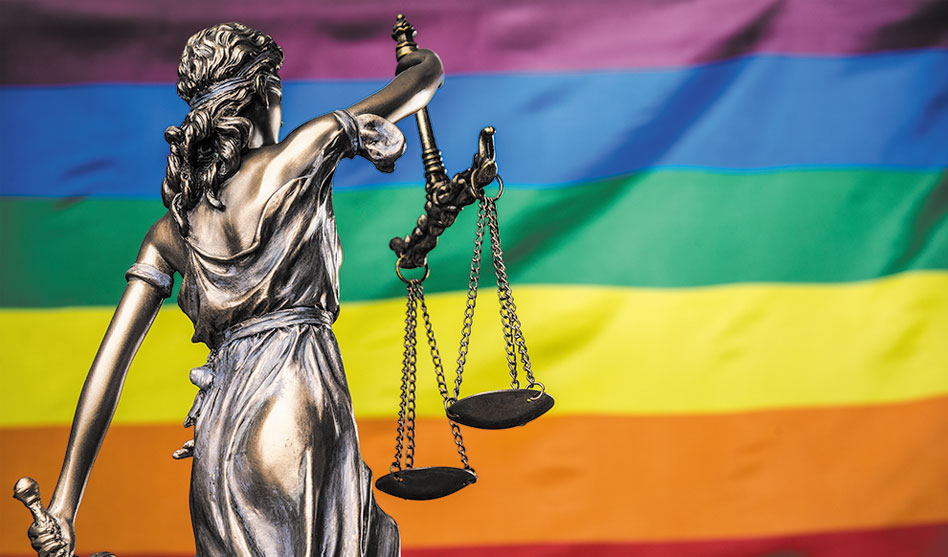Lawsuits filed in Texas question marriage equality
DAVID TAFFET | Senior Staff Writer
taffet@dallasvoice.com
 After the Obergefell marriage equality decision, we advised: Just because you can get married doesn’t mean you should get married. While that advice still stands, we add a caveat: Get married while you can. At least give it some serious thought.
After the Obergefell marriage equality decision, we advised: Just because you can get married doesn’t mean you should get married. While that advice still stands, we add a caveat: Get married while you can. At least give it some serious thought.
At least two lawsuits have been filed in Texas that question marriage equality. That wasn’t a serious concern until the Dobbs decision that reversed the Roe v. Wade abortion ruling and Justice Clarence Thomas invited cases that would revisit the marriage ruling. The goal of the suits is to limit, and in one case, reverse Obergefell.
Shotgun weddings just aren’t a thing in the LGBTQ community. Parents aren’t pushing their LGBTQ kids to rush into marriage. Lesbians just don’t get knocked up by their girlfriends. We plan our marriages and, if we decide to have children, we work hard to accomplish that.
Since there’s little tradition of actual, legal marriage in the LGBTQ community, we marry for the right reasons at our own pace. Pre-marital sex has never been an issue in the community, but there are a number of things to think about.
Think about marriage as being forever. Divorce is expense, emotionally draining and can get ugly. If you don’t think the relationship is going to last, don’t get married. Money is the other thing to think about. Tax law is different for a married couple than singles. That includes legally single partners. And in Texas, you’ll only be able to homestead one house as a married couple. An unmarried couple might get away with homesteading that lake house as well.
 But there are people in Texas working to undo marriage equality. If you’ve been thinking of getting married, it might be time to have a serious discussion.
But there are people in Texas working to undo marriage equality. If you’ve been thinking of getting married, it might be time to have a serious discussion.
In the first case filed in Waco, Justice of the Peace Dianne Hensley argued that because of her deeply held religious beliefs, she should be able to politely refer same-sex couples to other judges or justices of the peace.
The case was filed in 2019 and thrown out by a judge in an Austin State District Court in 2021. At the time, the ABC-TV affiliate reported Hensley said she always will follow the law. As a result of Thomas’ opinion opening the door to a reconsideration of marriage equality, she could refile her suit.
In a second case, Jack County Judge Brian Keith Umphress sued as an official with the authority to perform weddings. Not only does he argue marrying same-sex couples violates his religious beliefs, but his suit states there’s no constitutional right to same-sex marriage and Obergefell was incorrectly decided.
The lower court found against Umphress based on standing, because he had no pending judgment against him for refusing to marry a same-sex couple. He appealed, and his case was heard by the Fifth Circuit Court of Appeals last summer.
The Fifth Circuit has yet to rule. Unlike the U.S. Supreme Court, circuit courts don’t necessarily issue rulings during the term in which the case was heard. The conservative appeals court may have been waiting for something just like Thomas’ concurring opinion in Dobbs welcoming a challenge to Obergefell.
And those are just the cases that are already in the courts. Legal experts are expecting a flood of cases from public servants claiming they should be entitled to religious exemption and challenging the rights the Obergefell decision said were granted to us in the 14th Amendment.
The Dobbs case wasn’t about the legality of Roe. It was about the amount of time into a pregnancy abortions should be allowed. The fear is a simple case of recusal from participating in a same-sex wedding could turn into an overturn of Obergefell.
And just how would that work?
The precedent is California. In June 2008, the Legislature passed a marriage equality bill that the governor signed. In December of that year, a constitutional amendment went on the ballot to make same-sex marriage illegal. The amendment passed.
During the period from June to November, about 18,000 couples got married in the state. While no additional marriages could be performed, those that were performed remained valid.
That’s California. This is Texas.
If marriage equality is repealed by the U.S. Supreme Court, Texas could pass legislation declaring all marriages in the state null and void.
That would affect mortgages, inheritance and a variety of issues involving next-of-kin including the right to make end-of-life decisions and the right to not testify in court against your spouse.
Attorney Lorie Burch said reversing Obergefell would create a mess. But she didn’t think the Legislature would void marriages performed. Instead, the issue would be recognizing marriage.
How would that work between states? Would we go back to a patchwork of states that recognize our marriages? And would our Texas marriages be recognized in places like New york and California but not Texas?
And what about marriages performed in Canada? By treaty, don’t we recognize licenses issued by each other’s jurisdictions? Could Canada retaliate by not recognizing a Texas driver’s license, for example? After all, a Dallas County marriage license costs twice as much. Ridiculous? Yes. But so is the idea of repealing the right to marry.
And what about joint filing of income taxes? If marriages were suddenly not recognized but a formal divorce proceeding hasn’t taken place, how would a couple split carried over deductions or jointly owned property that produces income?
As Burch said: A mess.
Less of a mess would be continuing to recognize marriages that have already been performed and honoring marriage licenses that have already been issued.
So if you’re thinking of getting married, do so before the current court rules against our families. Your marriage could become null and void or at least not recognized, but you’ll have documentation that Texas recognized your relationship at one point at least.

